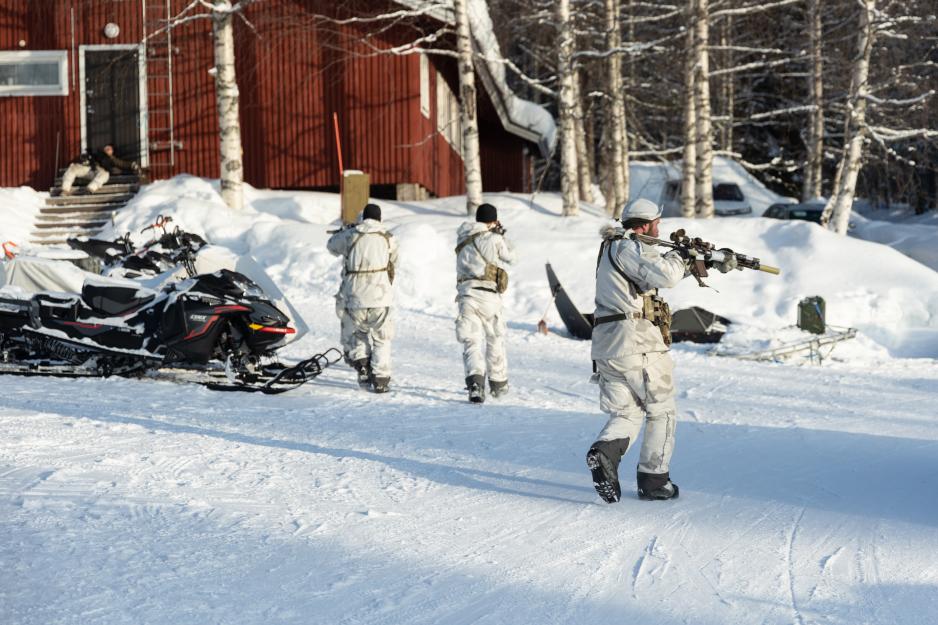New Defense Agreement Gives US Access to Several Military Areas in Finnish Lapland

Rovaniemi Air Base in Northern Finland has been pointed out as a Finnish-American agreed area in a new defense agreement. Here is an American military tanker aircraft of the KC-135 type at the air base. (Photo: Minna Pyykönen)
Finland's defense cooperation agreement with the US is now public. It will give American forces access to 15 military bases and exercise areas on Finnish soil. Five of these are in Lapland, Northern Finland.
On Thursday, Finland presented its negotiated agreement on defense cooperation with the US. It will be signed by the countries' ministers of defense in Washington D.C. on Monday.
The agreement regulates American forces' access to base areas, their legal status, and access to pre-storage of defense materiel in Finland.
The US will, according to the agreement, have unimpeded access to and use of 15 Finnish military bases and exercise areas, so-called "agreed areas." Five of these are located in Lapland, Northern Finland (see overview below).
Sweden and the US signed the same type of agreement last week, while Norway has an equivalent agreement with the American side that entered into force in the summer of 2022. These agreements give American forces access to four bases in Northern Sweden and two bases in Northern Norway.
In total, it appears that the US will be able to operate freely in 11 military bases and areas at the Cap of the North.
By extension, the new Finnish-American agreement will be processed in Eduskunta, the Finnish parliament. A constitutional committee will decide whether the agreement can be approved by a simple majority or if it will require a two-thirds majority.
Finnish-American agreed areas in the North:
Ivalo: Border guard base
Rovajärvi: Training area for the army and military storage area
Rovaniemi: Air station, Lapland's air flotilla, as well as the Jaeger Brigade's garrison
Tervola: Military storage area
Veitsiluoto: Military storage area
Exercise of authority
In these agreed areas, the USA will be able to exercise and train, deploy forces, and store materiel – jointly with Finland. American forces can also gain exclusive access and right of use to parts of these areas by their own agreement.
Within and in the immediate vicinity of such areas, American force members can exercise authority over Finnish citizens to maintain order or protect the force.
American security measures have to be "necessary and proportionate," but the interpretation of the threat situation and what calls for proportionate measures can be subject to different views, as pointed out by the Norwegian Judge Advocate General.
In extraordinary cases, and in line with agreed security plans, American forces may also take such measures beyond the immediate vicinity of agreed areas to maintains security, defense of, and continuity in their military operations.
These terms also apply in the Swedish-American and the Norwegian-American agreement.
Finland's government on why a total of 15 military areas are made available to the US:
"Finland has a strategically important location. Military areas in the east and west, north and south, are included in the annex. This provides flexibility in the cooperation with American forces, for example, in areas where it is natural to develop training activities. The number of areas can be compared with the number of similar areas in, for example, Sweden [17, ed. note]. The agreement does not necessarily imply any rapid change in everyday life in these areas, but provides an opportunity to develop cooperation if necessary."
Criminal jurisdiction
In the agreement, the United States is given the first right to prosecute American forces who have committed illegal acts on Finnish territory during their service. What applies to offenses committed outside the service seems unclear.
Finland can revoke this first right in special cases. This is described as relevant for offenses of greater social significance, sexual offenses, and crimes against life and health.
Sweden and Norway have given the USA primary jurisdiction in all criminal cases (crimes committed both on and off duty) and can also revoke this in special cases.

According to Finland's government, US presence in Finnish territories after the new defense agreement will first and foremost be connected to exercise activity and other cooperation that does not require a permanent presence. Here, American and Finnish special forces train together in Lapland in March 2023. (Photo: Anthony Bryant/US Army)
Finnish law bans nuclear weapons
Nuclear weapons are not explicitly referred to in the agreement between the US and Finland. Still, the agreement states that "all activities covered by this agreement shall take place with full respect for Finland's sovereignty, laws, and international legal obligations, including regarding the storage of certain types of weapons on Finland's territory."
The Finnish Nuclear Energy Act prohibits the import of nuclear charges, as well as the production, possession, and detonation of such in Finland. It is also prohibited and punishable to transport nuclear weapons through Finland.
"You can always change the legislation. And it may happen in the future. But it is also a very theoretical question whether the US would want to send nuclear weapons so close to the front line," says Matti Pesu, a researcher at the Finnish Institute of International Affairs (FIIA), to Yle.
The Swedish-American agreement also says nothing about nuclear weapons, while the Norwegian-American agreement includes a passage stating that Norway's policy regarding the storage and deployment of nuclear weapons on Norwegian territory is fixed.
According to the agreements with Finland, Sweden, and Norway, American forces must have exclusive control over access to and use of pre-stored defense materiel but must notify the relevant country's armed forces in advance of the type and amount of materiel they bring in.






